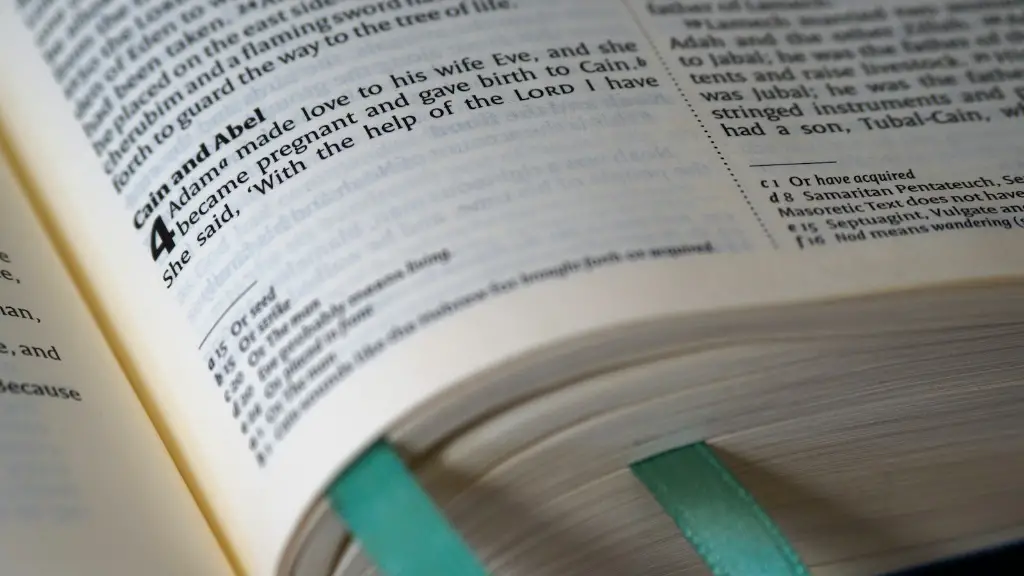The Bible is a collection of sacred writings, revered as the Word of God by followers of many different religions. While each person’s faith can have different interpretations of when a life begins, the Bible states that life begins at the moment of conception.
However, this does not mean that life is only considered valuable at birth. In biblical stories and teachings, people are seen to have the same rights and value throughout their entire life, from pregnancy to death. In the book of Exodus, the Bible states: “If men fight, and hurt a woman with child, so that she gives birth prematurely, yet no harm follows, he shall surely be punished accordingly as the woman’s husband imposes on him; and he shall pay as the judges determine.” This passage reflects how God values life in the womb, regardless of the stage of growth.
While the Bible addresses rightful punishment for anyone who harms a developing life in the womb, it also recognizes the purpose of the baby’s life. In Jeremiah 1:5, readers find, “Before I formed you in the womb I knew you, before you were born I set you apart.” This passage showcases how God intentionally brings life into this world and knows each individual from the start.
The Bible also includes stories of people who were individuals since their time in the womb. This includes passages about baby boys named Samson and Samuel, who performed activities for God as soon as they were born, seemingly having a connection to Him even before birth. Furthermore, the Bible includes stories of miraculous conception from virgin mothers, showcasing the power of God in the formation of life.
On the other hand, the Bible does not address the idea of aborting a life, a stigma that has become intertwined with the pro-life movement. This is a difficult topic, as religious people believe in being pro-life until the very end, while also sympathizing with different circumstances and experiences. No one can be certain that the original authors of the texts were suggesting that abortion is sinful.
Overall, while there are different interpretations of when life truly begins, the Bible makes its stance clear: life begins at the moment of conception. In stories and teachings, the Bible displays how God values each life, regardless of their stage of development – an idea that should be respected in the modern world.
Sacredness of Life
Just as the Bible celebrates a life even before it has been born, many religions believe that life is sacred and should be respected from the start of conception. Hinduism and Buddhism both have specific beliefs about the sanctity of life. For instance, some Hindu text states that unborn children have souls as soon as they are conceived.
In Buddhism, it is believed in some schools of thought that life is created at conception. They believe that the soul of a person is also created at this point, although its development will not be completed until right before or after the baby’s death. These similar beliefs about life throughout different religions serve as evidence for why life should be respected from the start.
Importance of the Bible’s Stance
Regardless on one’s religious beliefs, the Bible is a source of ethical guidance for many around the world. For this reason, its stance on when life begins is incredibly relevant in the modern world. This message of respecting life from the start of conception can be seen in many different societies. For example, the United Nations Universal Declaration of Human Rights declares in its Article 22, “Everyone, as a member of society, has the right to social security and is entitled to realization, through national effort or international co-operation and in accordance with the organization and resources of each state, of the economic, social, and cultural rights indispensable for his dignity and the free development of his personality.”
In conclusion, the Bible provides a concrete definition of when life begins: at the moment of conception and before. In stories and teachings, it displays how each life is intended to be respected and treated with dignity, whether they are in the womb or out in the world. The Bible’s stance on this topic is incredibly important and should be applied to modern society.
Legalities
Based on the Bible’s beliefs, the law has developed to protect a fetus and its rights. Today, this can be seen in countries like New Zealand, where a fetus’ rights are recognized by the definition of injury in the Crimes Act. This reflects the Bible’s stance, as the harm of a woman or fetus is seen as illegal, regardless of the stage of development.
Furthermore, the Bible’s definition of when life begins impacts how a person’s will is interpreted in legal terms. “Dead man’s clause” is a doctrine that is applicable if the birth of the beneficiary was due before the testator’s death or close enough that his life may be taken into consideration. It allows the child to benefit if they are able to later prove they are the same person before they were born.
In some countries, it is illegal to abort a pregnancy after a certain number of weeks, usually set at 22 to 24 weeks. This number is based on medical evidence, not the Bible, as a fetus is likely to survive after this point. However, it still reflects the Bible’s belief about life at the early stages of conception.
Scientific Evidence
The Bible may state that life begins from the moment of conception, but science provides evidence for this belief as well. This includes biological development that shows the divergence of DNA from the mother and father at conception.
On a cellular level, blood is able to differentiate amongst cells of the mother and fetus, which allows for the baby to form its own genetic makeup. Ultrasound imaging can also be used to detect a fetus’ heartbeat, which usually occurs in the 6th or 7th week of pregnancy. This indicates that life is forming.
The timing of the heartbeat also indicates how early certain organ systems can be functioning. In some cases, a baby’s nervous system begins to develop even before the 8th week of pregnancy, which means that the Bible’s definition is supported by medical evidence.
Different Circumstances
The Bible states that a life begins at conception but acknowledges that different circumstances can affect that definition. For instance, the Bible includes stories and discussions about miscarriages, where the mother loses her unborn child. This reflects an understanding that delicate processes and delicate stages of development must be respected, even within the Bible’s definition of life.
In other cases of fertility struggles, people turn to in-vitro fertilization to create life. While some people may argue that this is tampering with life, the Bible does not address the process. However, it does reflect the belief of theology that life is sacred, and should be respected even before it is created.
In certain cases involving high-risk pregnancies, the mother’s health can become relatively more important than the baby’s. Again, the Bible does not approve or disapprove of this decision, as it is based on the mother’s individual circumstance. However, it does emphasize that life should be respected, whether it is in utero or in the world.




